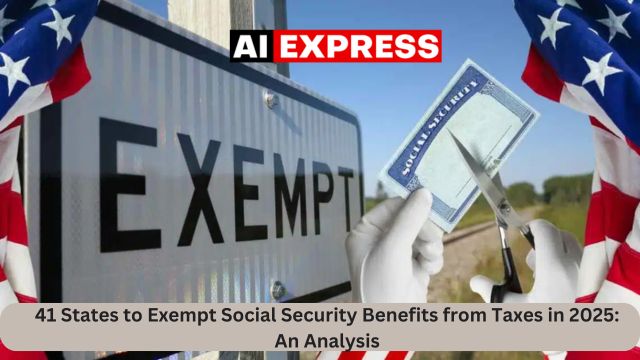Aiexpress – In a significant financial development for retirees, 41 states across the United States will not impose taxes on Social Security benefits for recipients starting in 2025. This policy shift leaves only nine states—Colorado, Connecticut, Minnesota, Montana, New Mexico, Rhode Island, Utah, Vermont, and West Virginia—continuing to tax these benefits as the new year approaches. For the 68 million Americans relying on Social Security monthly, this change offers an opportunity to optimize retirement plans and financial stability.
The Financial Implications for Retirees
Relocating to a state that exempts Social Security benefits from taxation can be a strategic move for many retirees. However, financial advisors caution that tax considerations alone should not drive relocation decisions. The cost of living, including housing, utilities, groceries, and healthcare, varies significantly across states and should factor heavily into retirement planning.
Cost of Living Breakdown in Select Tax-Exempt States
Here’s a detailed look at the annual cost of living in some states that will not tax Social Security benefits in 2025:
Alaska
- Annual Cost of Living: $49,916
- Housing: $14,124
- Utilities: $6,307
- Groceries: $6,068
- Healthcare: $11,544
Arizona
- Annual Cost of Living: $41,475
- Housing: $15,024
- Utilities: $4,283
- Groceries: $4,893
- Healthcare: $7,057
California
- Annual Cost of Living: $61,422
- Housing: $24,518
- Utilities: $5,752
- Groceries: $5,387
- Healthcare: $7,970
Hawaii
- Annual Cost of Living: $85,243
- Housing: $36,619
- Utilities: $7,472
- Groceries: $5,953
- Healthcare: $9,199
Florida
- Annual Cost of Living: $37,196
- Housing: $12,674
- Utilities: $4,486
- Groceries: $5,022
- Healthcare: $7,585
These examples highlight the diversity in living costs among tax-friendly states, emphasizing the importance of aligning financial plans with lifestyle preferences and budgetary needs.
Considerations for Retirees
When evaluating potential states for relocation, retirees should:
- Compare state-specific cost-of-living data to determine affordability.
- Assess access to healthcare facilities and quality of services.
- Consider proximity to family, climate preferences, and community resources.
Planning for a Secure Retirement
Living in a state that exempts Social Security benefits from taxation can provide financial relief and improve long-term stability. However, a holistic approach that factors in the cost of living and personal needs is essential for making an informed decision. By carefully evaluating all aspects of retirement planning, individuals can create a secure and comfortable future.













Leave a Reply